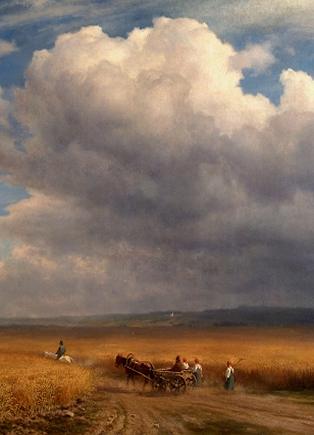Konstantin Balmont (1867-1942) was a Degenerate Poet par excellence.
He came from a family of landowners, probably of Scottish descent, who held lands in the Ivano-Voznesensk area, Russia’s 'Manchester’.
On political grounds, he was expelled from school and Moscow University, but gained a law degree from Yaroslav. After lengthy depression, a
broken marriage and a suicide attempt, Balmont became a translator and original poet. His first literary success came with ‘Under Northern Skies’ in 1894, and until 1905 Balmont was probably Russia's leading Symbolist. He left the
the country in 1917, and travelled widely, incorporating exotic material into his voluminous poems and travelogues. He was happy to participate in early street demonstrations but turned against the second 1917 Revolution, settling
eventually in France, where he became an alcoholic, and was committed to a sanitarium in 1930, dying there largely destitute and ignored. {1-2}

'I Came into the World to See the Sun' dates from the 1903 ‘Let Us Be Like the Sun’ collection, and is one of
Balmont’s best-known poems, being even admired by Mayakovski. Balmont was not indulging in much modesty here, but what he says is true: at his
best he was inimitable, in a rather vainglorious way.
Я в этот мир пришёл, чтоб видеть Солнце...
Я в этот мир пришёл, чтоб видеть Солнце
И синий кругозор.
Я в этот мир пришёл, чтоб видеть Солнце,
И выси гор.
Я в этот мир пришёл, чтоб видеть море,
И пышный цвет долин.
Я заключил миры в едином взоре.
Я властелин.
Я победил холодное забвенье,
Создав мечту мою.
Я каждый миг исполнен откровенья,
Всегда пою.
Мою мечту страданья пробудили,
Но я любим за то.
Кто равен мне в моей певучей силе?
Никто, никто.
Я в этот мир пришёл, чтоб видеть Солнце,
А если день погас,
Я буду петь… Я буду петь о Солнце
В предсмертный час!
1903
The TTS Audio Recording is:
The poem is written in iambics: AbAb:
Я в э́тот мир пришёл, чтоб ви́деть Со́лнце 5A
И си́ний кругозо́р. 3b
Я в э́тот мир пришёл, чтоб ви́деть Со́лнце, 5A
И вы́си гор. 2b
Ruverses have two renderings. I give
the first stanza of each:
W. Matthews
I came into this world to see the sunlight,
The skyline’s sapphire glow,
I came into this world to see the sunlight.
And peaks of snow.
Paul Selver
I came into this world to see the sunshine,
The sky-line's bluish lights.
I came into this world to see the sunshine,
And mountain-heights.
There's little here to discuss, and both renderings are fairly close. Both translators, wishing to reproduce the feminine ending, have translated the first line as 'I came into the world to see the sunlight'.
In fact the Russian says Солнце: 'sun'. 'Sunlight' would be солнечный свет.
I Came into this World to See the Sun
I came into this world to see the sun,
the blue horizon's light.
I came into this world to see the sun,
and mountain height.
I came to see what wealth the oceans stored,
or valleys in rich green.
My gaze will gather in the world, I’m lord
of all things seen.
I've conquered what was cold oblivion:
to my new dreams belong
these ever constant revelations, won
by constant song.
My dream of suffering fills the woken hours,
and I am loved for this.
Who can be equal to my singing powers?
No, no one is.
I came into this world to see the sun,
and if that day won’t flower,
I still shall sing and sing about the sun
till my last hour.
1903
1. Mirsky, D.S, Contemporary Russian Literature (Alfred A Knopf, 1926) 184-6.
2. Bristol, E., A History of Russian Poetry (1991, O.U.P.) 172-5.
Russian poem translations on this site: listing.